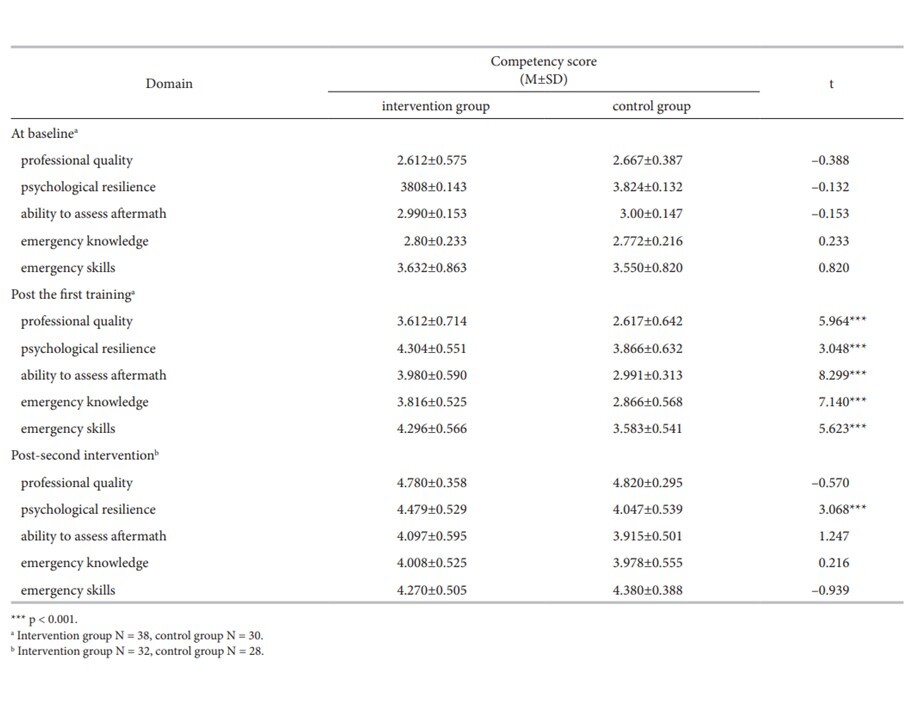Online first
Current issue
Archive
Most cited in 2024
About the Journal
Editorial Office
Editorial Board
Copyright and self-archiving policy
Information clause on the processing of personal data
Declaration of accessibility
Instructions for Authors
Instructions for Reviewers
Contact
Reviewers
2024
2023
2022
2020
2021
2019
2018
2017
2016
2015
2014
2013
Editing and translations
ORIGINAL PAPER
Assessing the effectiveness of training programme on the competency of medical staffs in public health emergency
1
Weifang University, Weifang, China (Department of Teacher Education)
2
Peking Union Medical College, Beijing, China (School of Population Medicine and Public Health)
3
Georgia Institute of Technology, Atlanta, USA (H. Milton Stewart School of Industrial and Systems Engineering)
4
Weifang Medical University, Weifang, China (Department of Psychology)
Online publication date: 2023-03-06
Corresponding author
Yuhan Zhao
Weifang University, Department of Teacher Education, 5147 East Dongfeng, Kuiwen District, Weifang, Shandong Province 261600, China
Weifang University, Department of Teacher Education, 5147 East Dongfeng, Kuiwen District, Weifang, Shandong Province 261600, China
Med Pr Work Health Saf. 2023;74(1):19-26
KEYWORDS
competencysystem professional trainingpublic health emergencyself-designed questionnairemedical staffstraining
TOPICS
ABSTRACT
Background: The competencies of medical staff in the public health emergency system and evaluated the effects of system-based professional training were investigated. Material and Methods: A competency model for individuals in a public health emergency management system was developed, which contained 33 items with 5 domains. A competency-based intervention was performed. A total of 68 participants from 4 health emergency teams in Xinjiang, China were recruited and randomly divided into 2 groups: the intervention (N = 38) and control groups (N = 30). Participants in the intervention group received competency-based training, while those in the control group received no training. All participants responded to the COVID-19 activities. The competencies of medical staff in the 5 domains were then analyzed in the pre-intervention, post-first training, and post-COVID-19 intervention using a self-designed questionnaire. Results: Participants’ competencies were at the middle level at baseline. After the first training, competencies in the 5 domains significantly improved in the intervention group; in the control group, there was a significant increase in professional quality compared in the pre-training. After the response to COVID-19, the mean scores of competencies in the 5 domains significantly increased in both the intervention and control groups compared with those in the post-first training. Psychological resilience scores were higher in the intervention group than in the control group, whereas no significant differences in competencies were found in other domains. Conclusions: Competency-based interventions provided practice and showed a positive effect on improving the competencies of medical staff in public health teams. Med Pr. 2023;74(1):19–26
We process personal data collected when visiting the website. The function of obtaining information about users and their behavior is carried out by voluntarily entered information in forms and saving cookies in end devices. Data, including cookies, are used to provide services, improve the user experience and to analyze the traffic in accordance with the Privacy policy. Data are also collected and processed by Google Analytics tool (more).
You can change cookies settings in your browser. Restricted use of cookies in the browser configuration may affect some functionalities of the website.
You can change cookies settings in your browser. Restricted use of cookies in the browser configuration may affect some functionalities of the website.






